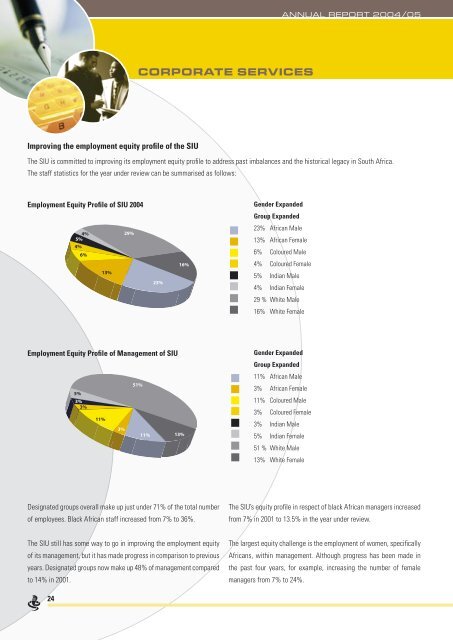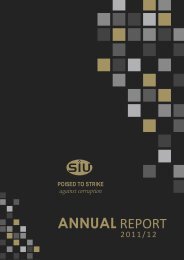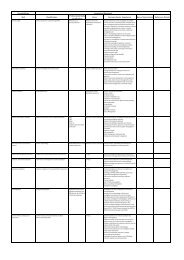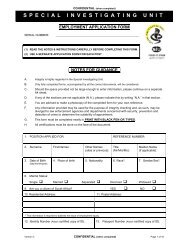Annual Report 2004/05 - Special Investigating Unit
Annual Report 2004/05 - Special Investigating Unit
Annual Report 2004/05 - Special Investigating Unit
Create successful ePaper yourself
Turn your PDF publications into a flip-book with our unique Google optimized e-Paper software.
ANNUAL REPORT <strong>2004</strong>/<strong>05</strong><br />
CORPORATE SERVICES<br />
Improving the employment equity profile of the SIU<br />
The SIU is committed to improving its employment equity profile to address past imbalances and the historical legacy in South Africa.<br />
The staff statistics for the year under review can be summarised as follows:<br />
Employment Equity Profile of SIU <strong>2004</strong><br />
<br />
<br />
<br />
<br />
<br />
<br />
<br />
<br />
Gender Expanded<br />
<br />
Group Expanded<br />
<br />
<br />
23% African Male<br />
<br />
13% African Female<br />
6% Coloured Male<br />
4% Coloured Female<br />
5% Indian Male<br />
<br />
4% Indian Female<br />
29 % White Male<br />
<br />
16% White Female<br />
Employment Equity Profile of Management of SIU<br />
<br />
<br />
<br />
<br />
<br />
<br />
<br />
Gender Expanded<br />
<br />
Group Expanded<br />
<br />
<br />
11% African Male<br />
3% African Female<br />
<br />
11% Coloured Male<br />
3% <br />
Coloured Female<br />
3% Indian Male<br />
5% Indian Female<br />
51 % White Male<br />
<br />
13% White Female<br />
Designated groups overall make up just under 71% of the total number<br />
of employees. Black African staff increased from 7% to 36%.<br />
The SIU’s equity profile in respect of black African managers increased<br />
from 7% in 2001 to 13.5% in the year under review.<br />
The SIU still has some way to go in improving the employment equity<br />
of its management, but it has made progress in comparison to previous<br />
years. Designated groups now make up 48% of management compared<br />
to 14% in 2001.<br />
The largest equity challenge is the employment of women, specifically<br />
Africans, within management. Although progress has been made in<br />
the past four years, for example, increasing the number of female<br />
managers from 7% to 24%.<br />
24








